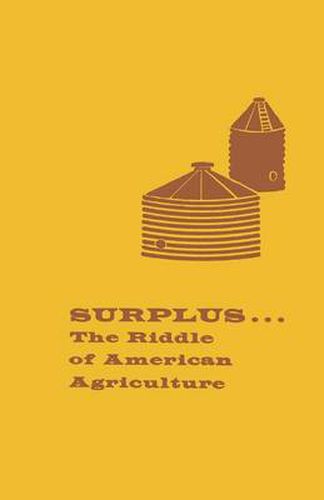Readings Newsletter
Become a Readings Member to make your shopping experience even easier.
Sign in or sign up for free!
You’re not far away from qualifying for FREE standard shipping within Australia
You’ve qualified for FREE standard shipping within Australia
The cart is loading…






This title is printed to order. This book may have been self-published. If so, we cannot guarantee the quality of the content. In the main most books will have gone through the editing process however some may not. We therefore suggest that you be aware of this before ordering this book. If in doubt check either the author or publisher’s details as we are unable to accept any returns unless they are faulty. Please contact us if you have any questions.
Excerpt from Surplus: The Riddle of American Agriculture On any public issue, the economist’s viewpoint is, of course, only one of many. On the issue of the food surplus, his viewpoint is urgently sought. Even among agricultural economists, however, views on the problem differ, and these several views are almost useless unless the layman knows them.
The layman needs supporting reasons for the views he seeks to consider. Our role is to interpret. We have tried to arrange the interpretation to help the reader focus more sharply on the many facets of the food surplus problem.
You may not be an economist, but you may have your own ideas on how the farm program should be handled. We seek to help you spell out these ideas and to look at other ideas held no less firmly by other people.
American farmers have worked themselves out of their markets. They have taken advantage of new technologiesand buoyant food prices. The result is more wheat, corn, cotton and other farm goods than they can sell and give away. The balance of grain and. Cotton, in particular, is bought and stored by the Federal Government. Helped by tax revenue, the Government has been guaranteeing prices of cotton, wheat and other so-called basic commodities.
You might say: Fine. The farmer has to contend with the weather. And he typically lacks monopoly powers over prices. Why shouldn’t he be able to expect fair prices for his products?
About the Publisher
Forgotten Books publishes hundreds of thousands of rare and classic books. Find more at www.forgottenbooks.com
This book is a reproduction of an important historical work. Forgotten Books uses state-of-the-art technology to digitally reconstruct the work, preserving the original format whilst repairing imperfections present in the aged copy. In rare cases, an imperfection in the original, such as a blemish or missing page, may be replicated in our edition. We do, however, repair the vast majority of imperfections successfully; any imperfections that remain are intentionally left to preserve the state of such historical works.
$9.00 standard shipping within Australia
FREE standard shipping within Australia for orders over $100.00
Express & International shipping calculated at checkout
This title is printed to order. This book may have been self-published. If so, we cannot guarantee the quality of the content. In the main most books will have gone through the editing process however some may not. We therefore suggest that you be aware of this before ordering this book. If in doubt check either the author or publisher’s details as we are unable to accept any returns unless they are faulty. Please contact us if you have any questions.
Excerpt from Surplus: The Riddle of American Agriculture On any public issue, the economist’s viewpoint is, of course, only one of many. On the issue of the food surplus, his viewpoint is urgently sought. Even among agricultural economists, however, views on the problem differ, and these several views are almost useless unless the layman knows them.
The layman needs supporting reasons for the views he seeks to consider. Our role is to interpret. We have tried to arrange the interpretation to help the reader focus more sharply on the many facets of the food surplus problem.
You may not be an economist, but you may have your own ideas on how the farm program should be handled. We seek to help you spell out these ideas and to look at other ideas held no less firmly by other people.
American farmers have worked themselves out of their markets. They have taken advantage of new technologiesand buoyant food prices. The result is more wheat, corn, cotton and other farm goods than they can sell and give away. The balance of grain and. Cotton, in particular, is bought and stored by the Federal Government. Helped by tax revenue, the Government has been guaranteeing prices of cotton, wheat and other so-called basic commodities.
You might say: Fine. The farmer has to contend with the weather. And he typically lacks monopoly powers over prices. Why shouldn’t he be able to expect fair prices for his products?
About the Publisher
Forgotten Books publishes hundreds of thousands of rare and classic books. Find more at www.forgottenbooks.com
This book is a reproduction of an important historical work. Forgotten Books uses state-of-the-art technology to digitally reconstruct the work, preserving the original format whilst repairing imperfections present in the aged copy. In rare cases, an imperfection in the original, such as a blemish or missing page, may be replicated in our edition. We do, however, repair the vast majority of imperfections successfully; any imperfections that remain are intentionally left to preserve the state of such historical works.